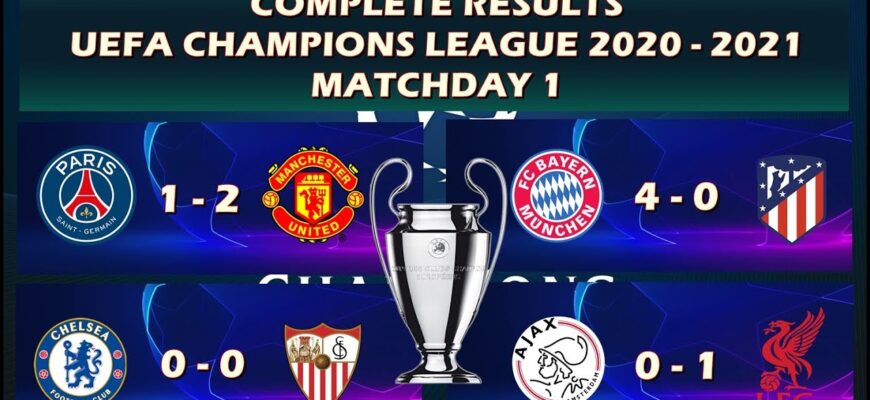The anthem has played, the banners unfurled, and the grand theatre of European club football, the UEFA Champions League, has once again thrown open its opulent doors. Matchday 1 is never merely a collection of fixtures; it is a strategic overture, a first glance at the tactical blueprints laid by seasoned managers, and an early litmus test for the continent’s elite. From Madrid`s subtle tactical rebirth to Munich`s relentless firepower, this opening week promised – and, in good measure, delivered – a compelling narrative of ambition and early assertions of dominance.
Real Madrid: The Alonso Era Begins with Purposeful Precision
Few clubs navigate the Champions League with the same almost divine right as Real Madrid. Yet, even kings occasionally require new advisors, and this season sees Xabi Alonso take the helm, ushering in what appears to be a more structured, arguably more stable, iteration of the Galacticos. Their opening encounter against Marseille was more than just a victory; it was a statement of intent, suggesting a shift from pure spectacle to calculated efficiency.
Alonso`s Madrid has thus far demonstrated a pragmatism that, while not entirely abandoning their traditional swashbuckling style, blends offensive flair with notably improved defensive solidity. The early beneficiaries of this new regime include the precocious **Arda Guler**, who is quickly carving out a role for himself, displaying an unexpected maturity for such a young talent. Then there is the ever-incandescent **Vinicius Jr.**, whose ability to conjure magic from thin air remains undiminished. While the spotlight often shines brightest on the established titans, the astute observer notes the burgeoning tactical coherence that could well see Real Madrid not just compete, but potentially reclaim their European throne. The anticipation for a dominant performance from Real Madrid felt less like a speculative gamble and more like an informed observation of a team confidently hitting its stride under fresh, exacting guidance.
Bayern Munich vs. Chelsea: A Clash of Form and Renewed Ambition
Wednesday delivered a headline act: Bayern Munich against a returning Chelsea, a fixture steeped in both history and recent dramatic encounters. For Chelsea, it marked a somewhat overdue return to Europe’s premier competition after a two-year hiatus, a period many Londoners might prefer to forget as a minor administrative oversight. The narrative here was multifaceted: the resurgence of **Cole Palmer** for Chelsea against the formidable, almost inevitable, presence of **Harry Kane** for Bayern.
Bayern Munich, even in the nascent stages of a new season, operates with a certain Teutonic precision. Their attack, spearheaded by the prolific Kane – whose goal-scoring seems less like an effort and more like a biological imperative – and the dazzling **Michael Olise** (a player with a clear point to prove against his former academy club), is a force of nature. Chelsea, under new management, has shown flashes of brilliance interspersed with bouts of inconsistency – a familiar narrative that leaves fans simultaneously hopeful and, perhaps, prone to occasional existential dread. The general consensus rightly pointed towards a Bayern victory, underscored by their sheer attacking firepower. Facing a team still grappling with its definitive identity and tactical philosophy, Bayern`s disciplined aggression often proves overwhelming. Kane, predictably, was identified as the man most likely to decide the contest, a testament to his seemingly effortless and ubiquitous goal-scoring prowess.
Newcastle vs. Barcelona: A Test of Depth and European Resilience
As Matchday 1 drew to a close on Thursday, attention shifted to the fervent atmosphere of St. James` Park, where Newcastle United hosted Barcelona. This clash posed an intriguing question: could the resolute English side, known for their unwavering spirit, upset a Barcelona team striving to reassert its European authority under the meticulous guidance of Hansi Flick?
Barcelona arrived with their own set of challenges, notably the absence of young sensation Lamine Yamal. However, Flick`s tactical approach emphasizes shared offensive responsibility, meaning talents like the ageless **Robert Lewandowski** and the dynamic **Raphinha** were primed to step up. Lewandowski, ever the predatory striker, showed he still possesses the clinical edge of a veteran marksman, while Raphinha, fresh off a bench-sparking brace, proved his capability to deliver under pressure. Newcastle, known for their defensive fortitude and disciplined structure, found themselves up against a technically superior and creatively fluid side. The predictions favored Barcelona, not necessarily through overwhelming dominance, but through their depth of individual talent and an almost inherent ability to convert crucial opportunities. The Champions League, after all, rarely tolerates a lack of ruthlessness, and Barcelona, despite their evolving identity, retains a keen sense for the jugular.
The Road Ahead: Early Lessons and Looming Challenges
Matchday 1 has painted a vibrant, albeit initial, picture of the season to come. It’s a tournament where tactical innovations are immediately scrutinized, and individual brilliance often tips the scales with elegant ease. Real Madrid`s early form suggests a formidable contender, Bayern Munich`s attack looks as potent and inevitable as ever, and Barcelona`s blend of seasoned experience and emerging talent promises an exciting, if sometimes nervy, journey.
While the initial tactical dispositions have been revealed and the early bets placed, the Champions League is notorious for its dramatic twists and unforeseen turns. The enduring beauty of this competition lies not just in its predictable titans but in the unforeseen upsets, the last-gasp heroics, and the blossoming of unexpected heroes. As the dust settles on this opening round, one thing remains abundantly clear: the road to the final in Budapest is long, arduous, strategically complex, and utterly captivating.









